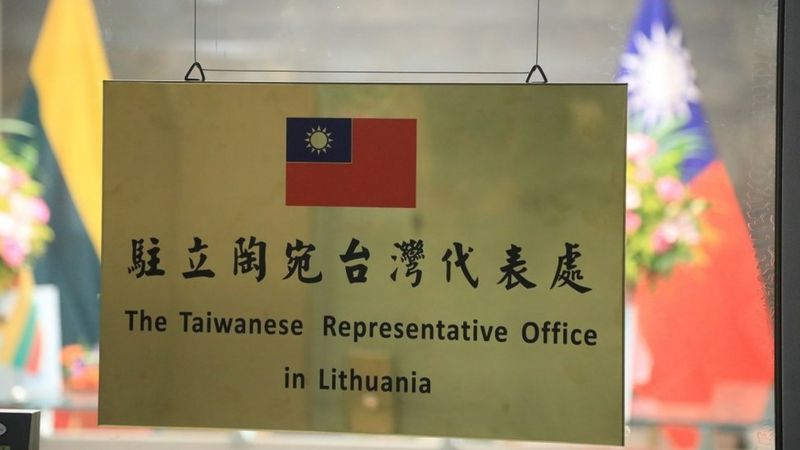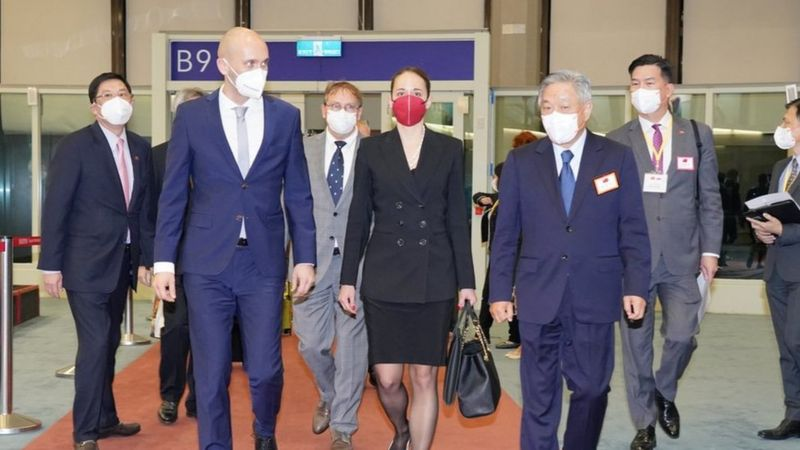Widgetized Section
Go to Admin » Appearance » Widgets » and move Gabfire Widget: Social into that MastheadOverlay zone
Slovak official delegation visits Taiwan
A delegation of 43 Slovakia officials and industry representatives, led by Karol Galek, deputy minister of Economic Affairs of the European Union, is drawing attention to the country’s biggest visit to Taiwan on Sunday since it opened a representative office in Taipei in 2003.
“Slovakia supports Taiwan and Slovakia is ready to be an equal partner, not only during the current difficult period of the COVID-19 pandemic, but also in the future when conditions are good,” Glick said at an inter-ministerial economic Cooperation advisory meeting between the two sides on Monday.
Last month, Another EU country, Lithuania, drew fierce protests from Beijing after it allowed Taiwan to set up a representative office there. The Chinese authorities downgraded relations to “charge d ‘affaires” level and threatened “diplomatic retaliation”. Last week, there were reports that Lithuanian goods could not be exported to China.
Slovakia’s high-profile visit to Taiwan has therefore raised concerns that its relations with China might follow the Lithuanian model, leading to a creeping shift in the EU’s triangular relationship with Taiwan and Mainland China.
Dr Zsuzsa Anna Ferenczy, a former political adviser to the European Parliament who now studies Eu-Taiwan relations in Taiwan, told BBC Chinese that Slovakia’s recent increasing interest in Taiwan must be seen in a wider context.
According to relevant data, the cumulative value of China’s foreign direct investment in Slovakia in the past 20 years (2000-2020) is only 200 million euros, making it one of the countries receiving the least Chinese investment in the EU, Ursula Said. She told the BBC the amount was “pitifully small” under the China-Central And Eastern European Countries cooperation Mechanism (16+1) initiated by Beijing. “The 16+1 framework promises a lot but delivers very little investment,” she said.

At the same time, Taiwanese investment from companies like Terry Gou’s Foxconn is on the rise, and Slovakia is showing interest in closer cooperation. “Taiwan is now the third largest East Asian investor in Slovakia, and cooperation in blockchain technology and space technology is also increasing,” she said.
Merics, a Berlin-based research think tank, also analyzed in its just-released annual report on eu-China relations that different departments and think tanks within the EU have different views on current EU-China relations, but all agree that the EU needs to have a diversified strategy to deal with Beijing and more policy tools to compete with Beijing economically.
According to Taiwan’s Ministry of Foreign Affairs, the Slovak delegation will attend the first Inter-ministerial Economic Cooperation Consultative Conference in Taiwan on Monday and hold meetings with the Ministry of Economic Affairs and the Ministry of Science and Technology. After that, the delegation will attend an investment forum and meet with Taiwanese President Tsai Ing-wen, among others. The meeting is a return visit of the Slovak delegation after gong Mingxin, chairman of the Development Commission of the Taiwan Executive Yuan, led a delegation to Eastern Europe in October.
The delegation consists of 18 senior officials from the ministry of Economy, Foreign Affairs, Innovation and Energy, Investment and National Academy of Sciences, and 25 manufacturers recommended by the Sri Lanian government, including biotechnology, space and semiconductor.
So far, Beijing has made no official comment on Sri Lanka’s visit to Taiwan. Not too early in the end of October this year, Taiwan’s foreign minister, Mr Wu visit to Slovakia and the Czech republic, the Chinese foreign ministry spokesman Zhao Lijian tough criticism “XieYangZiChong” tsai ing-wen, government, and said China “relevant countries encourage separatists’ resolutely opposed ‘Taiwan independence requirements of relevant countries abide by the one-china principle, does not provide platform for Taiwan independence separatist activities.”
In many comments, warmer relations with Taiwan in Slovakia and Lithuania appear to be opening the first door for Taiwan to enter the heart of EU diplomacy. A Taiwanese business delegation visited Slovakia in October and signed seven memorandums covering supply chains, trade and smart cities, said Ursula Fung, who has long studied relations between Central and Eastern Europe and the Asia-Pacific region. Hsinchu Science Park, a semiconductor hub in Taiwan, is also cooperating with slovak authorities. Slovakia has a strong interest in working with Taiwan to promote similar technology parks, especially since promised investment in Beijing has not been forthcoming.
For example, in addition to Beijing downgrading bilateral relations to charge d ‘affaires level, Last week (3 December) Lithuania confirmed that Chinese customs had recently removed Lithuania from its list of “countries of origin”, making it impossible for its goods to be imported to China, according to Reuters. Gitanas Nauseda, Lithuania’s president, expressed regret and said he would not attend the Games.
Ursula fung said China may continue to retaliate against those eu countries that are friendly to Taiwan. She sees Beijing’s strategy as a way to show the Chinese people that its top leadership will not allow countries to “disrespect” China.
Japan’s NATIONAL broadcaster NHK reported on December 4 that there are three factors contributing to the warming of eu-Taiwan relations. First, Europe is increasingly wary of Beijing due to the Hong Kong and Xinjiang issues. The second is the anxiety of several countries in Central and Eastern Europe over China’s “One Belt, One Road” investment commitment; Finally, Europe’s perception of Taiwan has changed. For example, Taiwan’s position at the forefront of global semiconductor technology and its performance in COVID-19 prevention have made Europe look at Taiwan with new eyes.
In Europe, it is now popular to say that EU members have the right to co-operate with Taiwan.
On December 30, Xi jinping met with EU leaders, German Chancellor Angela Merkel and French President Emmanuel Macron via video link. The two sides announced the completion of negotiations on an investment treaty.
However, NHK also stressed that China is the world’s second-largest economy, and its economic strength has a big impact on European countries, which are ‘open to question’ whether they are willing to risk a bad relationship with China by expanding diplomatic ties with Taiwan.
The Mercator Center report also points out that although the EU and major think tanks mostly support a multi-dimensional response to China, there are still differences on which level to go first.
In recent resolutions and reports, for example, the European Parliament has increasingly advocated a tougher strategy towards China, while also gradually exploring and expanding the possibilities for engagement with Taiwan. But within the EU, the Commission and the Council now seem inclined to “re-engage With China” to repair bilateral relations, which have been hit by the pandemic, and to put climate and economic engagement back on the agenda. In particular, the Mercator report emphasises that such divisions between EU institutions allow Beijing to divide the bloc.


